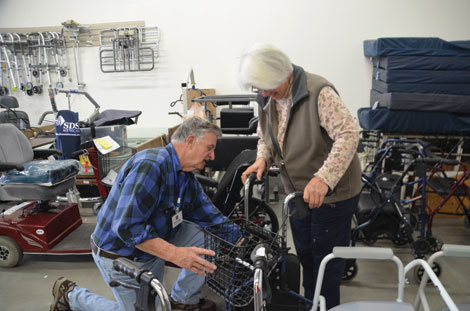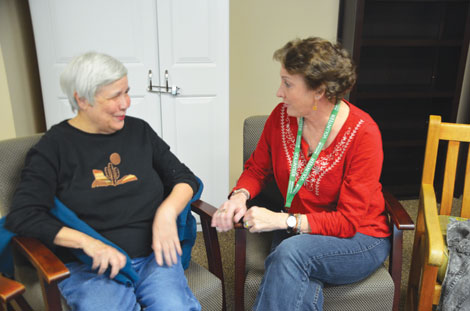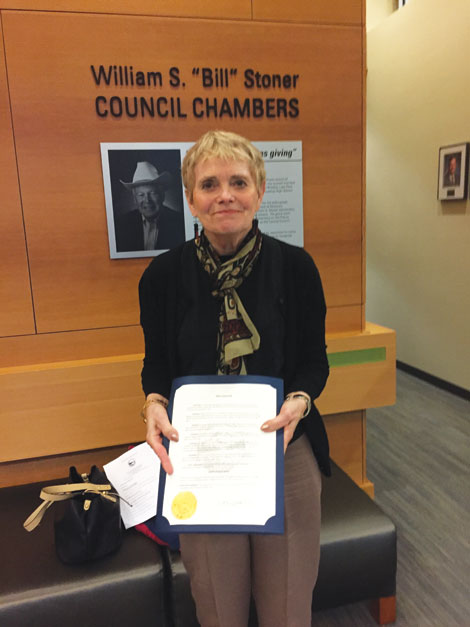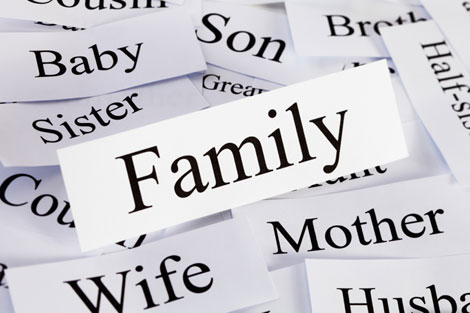‘They go out of here knowing they are no longer trapped in their homes’
Multiple Sclerosis Helping Hands Donor Closet (MSHH) Tacoma, located at 3635 South Lawrence Street, Suite E, opened its doors in July and has been busy ever since.
MSHH began in Edmonds 17 years ago as the brainchild of Bill Brayer. Brayer, who has had MS for the last 67 years, was co-facilitator of a support group when he stumbled upon some used medical equipment. He hauled it home to his garage and let folks know he would give it away to anyone who needed it.
“It was gone in an hour,†he said.
Folks heard of Brayer’s quest to help folks who needed the equipment, and suddenly a whole lot of used medical equipment started to pour in.
“A couple of people had equipment in their garage and called me, and soon my garage was filled up. I couldn’t get my cars in the garage any more so I’ve moved everything to a storage facility,†he said.
That move was followed by another to downtown Edmonds. MSHH is now located in a 7,500 square-foot space at 409 Howell Way in Edmonds.
MSHH became a non-profit agency and began accepting used equipment, refurbishing it and making it available to others at a greatly reduced price.
Brayer is now 83 years old and has turned over the reins of the operation to others.
“My health isn’t that great, and now I get stuff from there for myself when I need it. MSHH will go on forever for people who need equipment and can’t afford it,†he said.
MSHH is a source for people to donate medial equipment they no longer need and pass on to others who have a permanent or temporary need for it.
Customers walking through the door of MSHH Donor Closet in Tacoma are in for a pleasant surprise. They are greeted by volunteers and a wide variety of clean, repaired and well organized medical equipment ready to purchase for a suggested donation.
David Forrest, the Donor Closet manager, said volunteers organized and arranged equipment in June and opened the doors July 1. They are open Wednesday through Saturday from 10 a.m. to 3 p.m.
“Anyone that has a need for durable medical equipment is welcome,†he said.
The Tacoma location has a large supply, including hospital beds, rollators, wheelchairs, scooters, power chairs, lift chairs and walkers.
“We have a dedicated crew. A majority of folks we serve are seniors, but everyone is welcome,†said Forrest.
Laura Justice runs the front office of MSHH in Tacoma one day a week. She loves working with staff and customers.
“It is amazing when you connect a person with a piece of equipment they need,†she said.
When donations start to roll in, the staff gives each piece of equipment the once-over, making any needed repairs to be sure it is in good working condition and cleaning it up before putting it on the floor. All donations go right back into the cost of the building, supplies for keeping the building going, and the repair of equipment.
“Everyone is 100 percent volunteer, and no one that works here receives a penny,†said Forrest, adding that volunteers are always needed.
Gene Schwarz, who volunteers Wednesdays and Fridays, owned a medical equipment company for 17 years and had been retired for 20 years. When he received a postcard announcing the opening of MSHH in Tacoma, he went right down and volunteered.
Schwarz is a pro at helping customers learn how to use equipment and makes sure they are comfortable with it before they take it home.
“I don’t like to send anything out the door that people don’t know how to use,†he said.
Pat Laferriere, a customer who was looking for a piece of equipment for a friend who has Parkinson’s disease, appreciates the hands-on treatment of the volunteers.
“It is different here. Everyone is a volunteer and they either have a disability or know someone who has one, and they really care. They give you information and insight,†she said.
Gene Borden, manager of the Edmonds location, moved to that area after his wife died in 2007. “After three weeks I was so bored,†he said. “My landlord owns the MSHH building, and when I came in to pay my rent, I asked if there was anything I could do. Sure enough, there was. I’ve been here nine years now.â€
Borden said he gets a real thrill out of seeing people’s faces when they find the right medical equipment.
“They go out of here knowing they are no longer trapped in their houses,†he said.
Brayer said he is proud of what MSHH has accomplished. He said some doctors steer their patients to MSHH when they are in need of equipment.
“I kept it going for 17 years working five or six days a week and running the support group,†said Brayer, who still runs a group in Edmonds.
Joan Cronk, who wrote this article, is a freelance writer.



